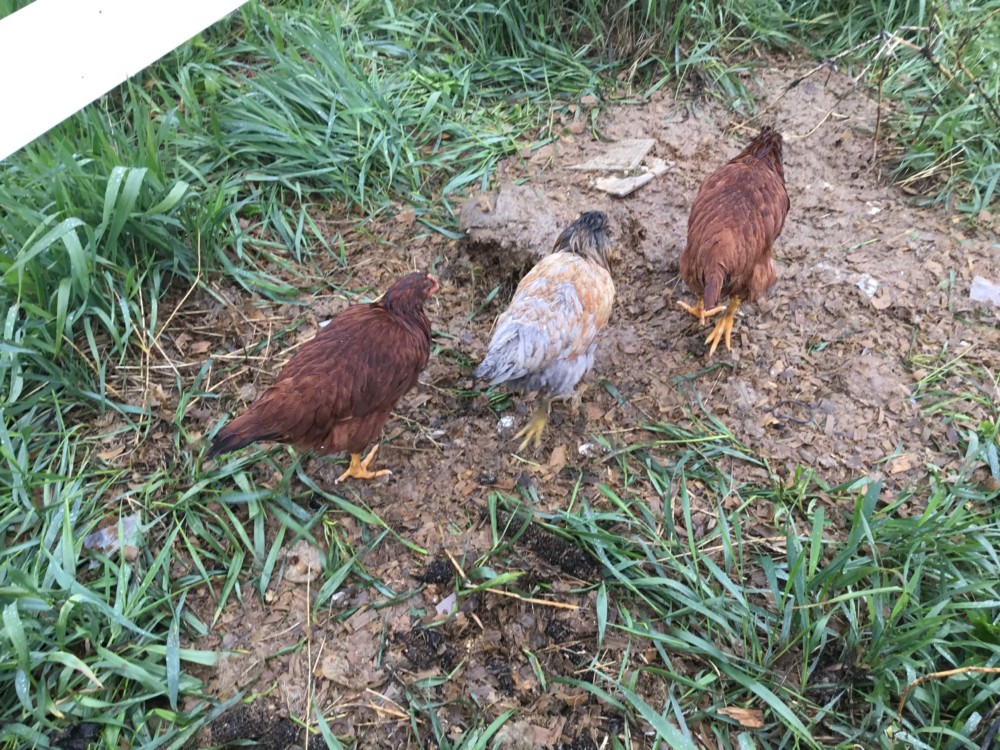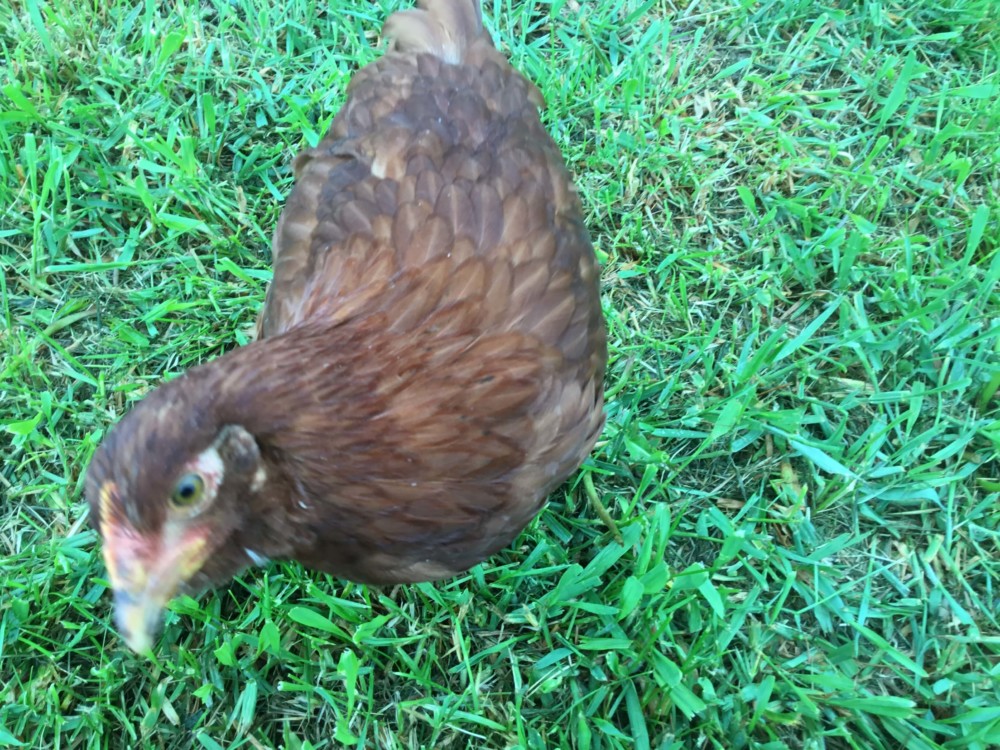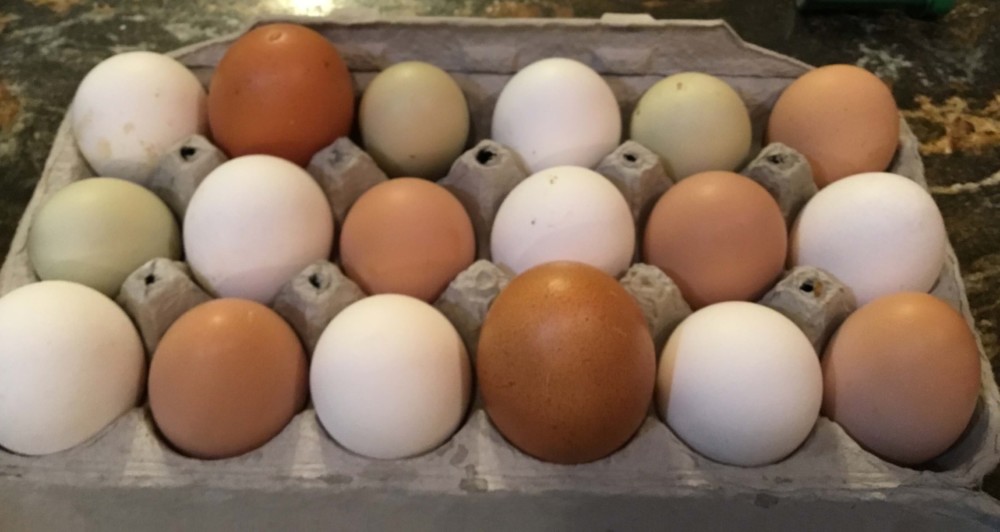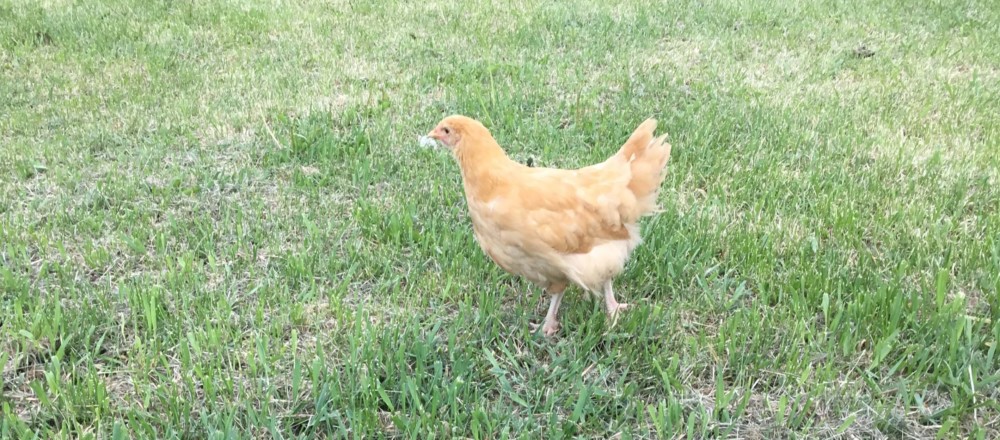Have you thought about raising backyard chickens? Chickens provide a steady supply of eggs and can bring a pleasant, rural, country atmosphere to an otherwise suburban or even urban backyard. But, chickens are loud and that can create an issue with neighbors. Is there any way to limit the noise of chickens?
Why do chickens cluck so loudly? Chickens are loud for several reasons. Some breeds are louder than others. Hens are especially loud just before laying their eggs, when they feel cooped up or are otherwise upset with their living conditions, and when they feel threatened.
Can you make a chicken be quiet? Selecting a quieter breed will help to limit overall noise and also limiting environmental factors that lead to noisy chickens. Be sure that your chickens feel safe and have plenty of room to roam around.
Chickens make dozens of different noises. Learning to recognize and understand these noises will help you know how to turn the volume down on your feathered friends.
The Meanings Of Chicken Noises
Did you know?
Researchers have found that chickens make between 24 and 30 unique sounds. You may think that you’re hearing an inane mix of clucks, coos, and squawks; but in fact, each sound has a meaning as part of a simple kind of language. Once you start listening, you will understand why your chickens are being so loud.
Let’s take a look at some of the loudest sounds chickens make. These include
- Irritated pre-egg squawks
- The egg song
- Shrieks from being too confined
- Alert calls including cackling and cawing
The Squawking Before Laying An Egg
Hens will lay eggs approximately every 24 hours. Before laying an egg, a hen will usually start squeaking. I’ve seen one or two hens strutting around the coop squeaking because another hen is using their box. For some reason, they all want to use the same box and won’t use different boxes.
After laying their eggs, chickens will make a series of noises commonly referred to as the egg song. This song sounds like a series of bucks followed by a shrill bugawk. This song signals to the other chickens that the hen has finished laying. It sounds sort of like a brag song.
The hen says “Yes! I am all that and more!” Sometimes the other hen will answer the egg song.
Pre-egg squawking and the egg song are loud enough that you might hear them, but probably not so loud that the neighbors would hear them. This is good because these are the noises you have the least amount of control over.
Any hens who lay eggs will make egg sounds, but the degree of the noise can depend on the breed. This article will cover breeds a little later.
Chickens Make Noise When They Feel Cooped Up and Claustrophobic
Chickens hate being confined during the day. Once the sun comes out, chickens get noisy if they are still cooped up.
Chickens will continue to let out a long shrieking sound as long as they feel confined. This can also occur if you have too many chickens for the amount of space. Generally, a chicken coop should provide 2-4 square feet per bird. A chicken run should allow for as much as 10 sq feet per bird.
You can reduce the noise of the chickens in the morning by letting your chickens out of the coop as close to sunrise as possible.
But, if you don’t like getting up that early, don’t worry! An automatic door on your coop can make it easier to keep your birds quiet and sleep in!
Chicken Frightened Noises
The loudest sound you are likely to hear from your chickens is the sound they make when they feel that they are in danger. Chickens actually make two distinct alarm calls. They cackle and caw for ground-based and aerial-based dangers. Both of these sounds are loud, piercing shrieks.
Chickens will raise the alarm call whenever they feel threatened. There are a number of things that can set chickens off. They can be spooked by legitimate dangers like cats and hawks, but also by loud noises and planes flying overhead.
How To Keep Chickens Quiet
For many a suburban chicken owner, keeping a chicken quiet becomes a desperate tactic. There are several things you can do to help your chickens be quieter.
1. Don’t Have Roosters
This seems like a common-sense step, but I keep running into people who think they can somehow make their rooster be quiet.
Roosters are noisy. They are protective of hens. And they crow, and crow.
There isn’t a humane way to keep a rooster quiet. It’s better to just avoid adding a rooster to your flock.
2. Provide A Safe Haven For Your Chickens
First, the best way to avoid the most grating of chicken noises is to do your best to allow your chickens to feel safe and secure. Make sure your property is fenced off and that your chickens have covered areas where they can feel safe from aerial threats.
Make sure that dogs or other pets don’t have access to the chicken run as this will also startle the chickens.
When your chickens raise the alarm, they will usually be calmed by seeing you come out. This will help them to feel safe.
3. Keep Your Chicken Coop At Least 1 Foot Below Your Fence Line
If you are trying to keep the noise away from neighbors, then place your coop lower than the fence line. This will help to block some of the sound. It will also keep your chickens from being frightened from outside disturbances.
4. Start With A Small Flock
You may want heaps of eggs every morning for breakfast, but if you live in a more urban environment, it’s really better to start small.
Starting small will ensure that you have plenty of space for your hens. It will also give you time to make the adjustments and help your flock to be quieter. The more chickens you have, the louder they are going to be.
Starting small also gives you a chance to see if you have a specific chicken or two that are much louder than others. It gives you time to adjust your flock or make changes as needed.
5. Keep Your Coop Clean
Happy chickens will be quieter chickens (for the most part). Keeping your coop cleaned out and sanitary will help your ladies to be happy.
It will also help to cut down on possible disease, flies, smell, and attracting other animals to the area.
6. Clip Their Wings
When I first got chickens I had read a lot. Everything I read said that chickens don’t fly well and that they are pretty easy to keep inside the yard.
Hogwash. Even with a chicken run larger than a ¼ an acre, my chickens were constantly flying over an almost 4-foot fence. Clip your chickens’ wings early. This will help them to train not to fly over the fence.
Nothing is noisier than a chicken that gets into the wrong yard and finds itself confronted by a dog or cat. And, this will surely annoy the neighbors.
7. Put a radio on a timer in the coop for the mornings
I am not sure how a radio that turns on in the morning works, but many chicken owners have sworn that radio in the coop helps to keep chickens quieter. The radio should be on a timer and turn on around sunrise.
Some people speculate that because chickens feel safer around people, that hearing human voices on the radio helps to calm them down.
8. Train The Noisy Chickens With Water
Sometimes you will have a really loud screaming chicken. And, sometimes, hens can be particularly stubborn.
Be available outside and every time your screaming hen starts to yell, spray her with a squirt bottle or the hose. Don’t use the jet setting on your hose- you don’t want to hurt her. But, get her face when she starts to squeak.
In order for this training method to work, you will have to be very consistent for a few days. Even very stubborn hens will eventually give in.
But, sadly, if you have a hen that is more stubborn than you have time or patience for training, you may have to find a new home for the loudest member of your flock.
9. Use A Blackout Box
If your girls are still noisy in the early mornings, and the radio hasn’t worked. You can also try a blackout box. Chickens rely on the sun to know when to get up.
If your daylight hours vary widely, you will notice that the chickens get noisy much later in the winter when the sun comes up later than they do in the summer.
You can “imitate” the winter daylight hours with a blackout box.
A blackout box is a completely dark chicken coop. Some people use a garage for the same purpose. Others blackout the chicken coop’s windows so light can’t get in.
The longer hours of darkness helps to keep the chickens quiet until a more sociable hour.
Make sure that your blackout coop still has good ventilation. Also, make sure that it’s in the shade so the inside doesn’t get too hot and cause harm to the chickens.
10. Bribe Neighbors With Eggs
Even after doing your best to quiet down your hens, you may still have an occasional racket. That’s where it comes in handy to bribe your most annoyed neighbors.
Farm-fresh eggs have soothed more than one neighbor’s ruffled irritation and made friends.
11. Stock Your Flock With Quieter Breeds
Certain breeds are much quieter than others. If quiet is important, then make sure that you get hens that come from more quiet breeds.
And, make sure they are purebred. Half-breed chickens are often much noisier than their full-breed cousins.
12. Rehome The Noisiest Hens
If all else fails, you may still have an occasional chicken that’s loud and obnoxious. If nothing you’ve done has helped, you may simply have to find a new home for the noisy girl.
- Don’t Have Roosters
- Provide A Safe And Secure Place For Your Chickens
- Keep The Chicken Coop At Least 1 Foot Below The Fence Line
- Start With A Small Flock
- Keep A Clean Coop
- Clip Their Wings
- Use A Radio And A Timer
- Train Chickens WIth A Spray Bottle Or The Hose
- Use A Blackout Box
- Bribe Neighbors With Eggs
- Raise Quiet Breeds
- Rehome the Noisiest Chickens
The 13 Quietest Chicken Breeds (3 are rare)
If you live in an area where noise is a concern, you can help to alleviate some of the stress by raising quieter chicken breeds. Ten breeds have reputations for being docile, good-tempered, and quiet.
The quietest chicken breeds are:
- Bantam Varieties
- Australorps
- Wyandottes
- Brahmas
- Cochins
- Orpingtons
- Barred Rock
- Rhode Island Reds
- Java
- Ameraucana
- Speckled Sussex
- Delawares
- Faverolles
Bantans
Ok, ok, I know. Bantams aren’t actually a breed. A bantam is a small version of a chicken. They lay smaller eggs and are smaller than regular-sized chickens. Some breeds of chickens only come in a bantam size, but other breeds have a smaller bantam version.
Nevertheless, it goes without saying that a smaller chicken makes less noise. If you want to have the most success with quiet hens, then get a bantam that is a real bantam- meaning it’s one of the breeds that only come in bantam sizes.
The Nankin, Sebright, and Rosecomb breeds are all pure bantam breeds.
Australorps
Australorps are one of the most popular urban chicken because they are usually quiet. They are also incredible egg-layers. This breed has the record for most eggs laid in a year and can lay up to 250 eggs per year. In some cases, they lay even more.
Australorps are quiet and calm. If you want chickens that lay eggs like crazy and do it quietly, an Australorp is a great choice. They also like to keep to themselves.
Wyandottes
Wyandottes are often recommended to backyard chicken owners in more urban environments. This breed is hardy, quiet, and productive.
Wyandottes do well in smaller spaces and won’t squawk as badly. This makes them better for small yards than other breeds.
They adjust well and can handle more difficult conditions.
Brahmas
Brahmas grow to a large size. They are slow-growing so they aren’t raised as much anymore for meat. Newer breeds are often raised for meat in a matter of 5-6 weeks.
Yet, Brahma’s are also dependable egg layers. The Brahma goes by the nickname, “the King of Poultry” because of their size. These birds are incredibly hardy and are some of the best winter layers.
Because of their size, they don’t tend to get stressed out as easy. They are very laid back and take life with a mellow attitude. As a result, they are generally friendly and are not loud.
Cochins
Cochins are mediocre egg layers, but they are extremely friendly and nurturing. Cochins are so good-natured that they are frequently kept as pets.
The Queen of England once famously kept several. They can be used as sitters or surrogate mothers because of their maternal skills and caring nature.
Cochins tend to be quiet and to not get ruffled by many things.
Orpingtons
There are several breeds of Orpingtons, including black, white, blue, and buff.
All of these have very calm temperaments and generally allow their owners to pet and hold them. But, the Buff Orpington is probably the most well-known for being mellow and quiet.
If you’re looking for a little companionship from a quieter bird, an Orpington may be the way to go.
Barred Rock
Barred Rock chickens are also called Plymouth Rocks. They are very hardy chickens that are friendly and quiet. They usually love their human owners and interact well with kids and people.
Barred Rocks do very well in colder climates and don’t usually squawk or have clucking wars with other chickens. They are mellow and well mannered. They are great foragers and excellent at catching bugs.
They are also great eggers and can lay over 200 eggs a year!
Rhode Island Reds
Rhode Island Reds are one of the most popular chicken breeds in the entire world. They lay 5-6 eggs a week.
Although Rhode Island Reds aren’t as friendly as some of the other breeds, they are quiet. They will keep to themselves and won’t make a lot of noise.
Java – Rare
The Java is one of the oldest chicken breeds in the United States. They were bred in the early 1800s. Javas do best in a free-range environment.
They are usually raised for meat and eggs. Javas love smaller flocks best and they like to keep to themselves.
Javas are quiet and usually content chickens. They are fairly healthy chickens that do well in a variety of climates.
Araucana – Rare
The Araucana chicken is super rare but is a quiet, content chicken. It is one of the quietest chickens around. Although chicks will cost you a pretty penny because of their rareness, raising Araucana chickens will help the breed, which is struggling to survive.
Many hatcheries sell a relative to the Araucana, called the Ameraucana. Ameraucana is also difficult to find as a full-bred chicken. Both types of chickens lay blue eggs, which makes them b=prized as an egg chicken.
But, be aware!
Ameraucana, americana, and other spelling variations to the Ameraucana are not pure breeds. Name mis-spellings mean that the chicks have only partial Ameraucana heritage. The rest of the lineage is unknown.
That means that many chicken owners complain that their Ameraucana chickens are the noisiest hens they own. So, be careful when purchasing this breed to make sure you are buying one of the two pure-bred breeds.
Speckled Sussex
These are a great small-yard chicken. For centuries, they were kept in small spaces and they don’t get “cooped up” as much as other breeds.
They are decent egg-layers and will lay 4-5 eggs a week, depending on the season. They are very adaptable chickens that do well in both hot and cold climates.
They are gentle and curious birds.
Delawares
Curious, friendly and docile, the Delaware chicken is also quiet. It’s raised for both meat and eggs and is a cross between a New Hampshire hens and Barred Rock roosters.
Delaware chickens are sometimes difficult to find and often not considered a breed, even they were admitted as a breed in 1952 to the American Poultry Association.
Faverolles – Rare
Faverolles are an odd-looking bird is dual purpose. They are a medium egg layer, laying about 150 eggs a year.
Faverolles do well in the colder climates, but they don’t do well in the heat. They have a lot of additional feathers around their feet and sport head muffs.
They are excited and happy to be around. In a flock, they tend to be submissive to other breeds of birds and should be watched to make sure they aren’t being excessively bullied.
Conclusion
If you have struggled with noisy hens, don’t despair. There is a solution! You may be able to get your existing hens to quiet down with a few adjustments, but if not, there are quarter breeds that can make backyard chickens much more fun and quiet.
Related Articles
How To Provide Entertainment To Chickens. Stop Bullying!
Ideal Chicken Breeds For Small Backyards and City Living
7 Superstar Chicken Breeds That Lay Over 300 Eggs A Year
My Favorite Chicken and Duck Supplies
This list contains affiliate products. Affiliate products do not cost more but helps to support BestFarmAnimals and our goal to provide farm animal owners with accurate and helpful information.
Manna Pro Oyster Shell keeps eggs strong. Before I gave my chickens oyster shell, I had the oddest eggs, many with weak and irregular shells. Now, I don’t have an issue.
Layer Feed by Manna Pro. I like pellets rather than crumbles as my chickens eat them better and less gets wasted or scavenged by rodents. A good layer feed makes the difference in hens laying many more eggs.
My chickens love this mealworm treat, which gives added protein, something that’s great during molting and winter months.
There are many ways to feed and water your chickens. I like this food and water setup the best because it reduces waste, saves me time feeding and watering, and keeps the food fresh longer. Except, in the winter, I use a heated waterer. The only problem is the heated waterers need to be replaced every few years.
I love this chicken veggie hanger. It makes it easy to give your chickens produce from the garden and keep them occupied in the winter with a fresh head of lettuce.
These chicken toys are a hoot! They will help curb bullying and keep your chickens active, especially in the winter when hens tend to get more lethargic.





